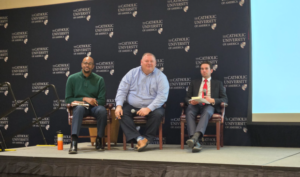Republican Party’s Direction Remains Unclear

Image Courtesy of PrescotteNews
By Jack Rowing
Earlier this month, a group of 120 prominent Republicans met over Zoom to discuss strategies and policies for the Republican party with a key uniting force: They were going to work against the Donald Trump force in the Republican party.
Citing the events of January 6 and the subsequent acquittal of the former president for his role in the armed insurrection, many prominent Republicans from the Reagan, H.W. Bush, and W. Bush administrations discussed multiple paths that could be taken. Most importantly, they discussed which of those paths would create the most vibrant conservative party that was both conservative and broken away from Donald Trump.
This conference came after news that a prominent anti-Trump group, The Lincoln Project, had received allegations of a massive scandal involving its founder, John Weaver, He was accused of multiple accounts of sexual harassment. As more information has surfaced, it is possible that other members of The Lincoln Project could be held liable for knowing about the conduct and failing to come forward and denounce the actions of their founder before it reached the public eye. Regardless of how the story broke, The Lincoln Project is in disarray, leaving a vacuum. There is currently no other major Never-Trump conservative political group with the national recognition achieved by The Lincoln Project. Dr. White, a Professor of Politics of CUA, and author of What Happened to the Republican party, told the Tower that it is not out of the question for another group to form amidst this gap.
While the meeting discussing a new Republican party was private, Former Member of the House of Representatives Charles Dent, Former Independent Presidential Candidate Evan McCullin, and even Former Trump Administration Communications Director Anthony Scaramucci were confirmed to be in attendance and later discussed what was said.
Charles Dent spoke to his worry that now that Donald Trump had been acquitted he worried that “that Trump will feel vindicated. He’ll feel like he’s been exonerated.” Following the riot on January 6, over 33,000 members of the GOP in California left the party. In the key state of Pennsylvania, 12,000 Republicans left the party. Republicans who remain loyal to Trump deny his involvement with the insurrection and have even gone so far as to blame Antifa for the violence.
Given the solidification of Trump’s hold over the Republican party through moderates leaving and polarization, one could argue the Republican party is unsalvageable as Donald Trump has cemented his hold over both the base and the members of Congress. Toward the end of the meeting, a poll was taken of the 120 members there, and 40% said they would support the emergence of a third party while 43% of the group said they would form a faction within the GOP similar in practice to the Freedom Caucus, or Progressive Democrats. However, when two prominent anti-Trump members of Congress, Representative Cheney and Representative Kinziger, were asked whether or not they would consider leaving the Republican party to join a third party, both resoundingly said no.
In an interview with the Washington Post, Evan McCullin spoke on a separate issue for any new group that emerged. While most were in agreement that they would attempt to win GOP primaries against Trumpian conservatives, a question the group did not resolve was whether they would support unifying Democratic candidates over Trumpian Republicans. While McCullin said he would support “unifying Democrats,” he perhaps may represent an anomaly within the group, especially considering he admitted to joining the party as a tactical decision. Dr. White, said “the short-term these Republicans will either not vote in 2022, or will vote Democratic. They have a strong sense that democracy is at stake. I think it’s going to take several election cycles to sort all of this out, and there is no realistic immediate solution.” An old political axiom is that Democrats fall in love, Republicans fall in line. This axiom has held mostly true throughout many contentious sets of primaries. Republicans back usually fall in line behind their candidate. Trump, however, may prove to be an exception to that rule as more Republicans debate whether or not they will stay united in a party behind his values. An appeal to Republican values and efforts by groups like and including this one represents an ongoing war within the GOP to reclaim or hold onto the political apparatus in order to achieve different policy ends.








